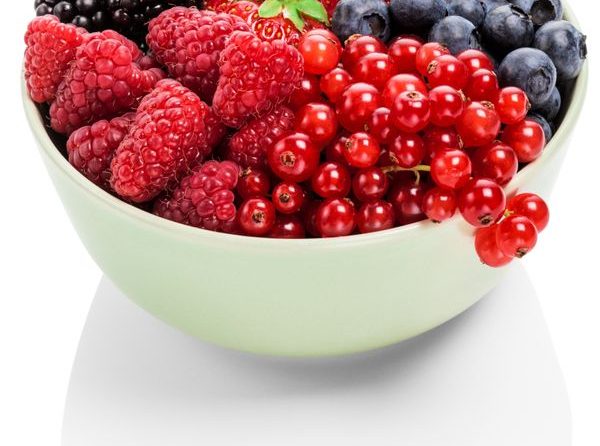
You’ve heard it a million times before: You are what you eat. And in regards to your skin, that old adage is especially true. “Good skin relies on an adequate supply of essential nutrients,” says certified nutritionist and dietician Nicolette Pace.
“Some studies indicate that it is indeed possible to delay aging and get an improvement in skin condition by improving your diet.” Improving your diet is as easy as adding certain key foods—foods that can help with everything from wrinkles to dark spots to sagging skin. Did we mention that they’re also delicious? You won’t believe how good fighting aging can taste.
Tomatoes
Tomatoes are so much more than a pretty salad topping. They’re packed with vitamin C, which helps build collagen and, in turn, makes your skin look firmer and plumper. They also have lycopene, which protects your skin from UV damage and improves your vascular system. According to Pace, after six weeks of eating tomatoes regularly, all that extra circulation will give you a noticeable glow.
Berries
Blueberries and raspberries are Pace’s top picks. They contain flavonoids, polyphenols, vitamins, probiotics, and tons of antioxidants. “They’re free-radical scavengers,” explains Pace. If you’re concerned with the effect your environment — anything from pollution to elements in your water — is having on your skin, add more berries to your diet. “They can even promote cell regeneration for new skin,” says Pace.
Green Tea
In order to keep your skin looking as young as possible for as long as possible, your cells need to regenerate correctly. (Cells that mutate can lead to everything from uneven pigmentation to cancer.) “Green tea has lots of antioxidant power, as well as a chemical call EGCG,” says Pace. “In multiple studies it was shown to help cells grow properly and maintain a healthy life cycle.”
Yogurt and Kefir
To fight redness and irritation, Pace recommends introducing foods with more probiotics, like yogurt, into your diet. “Skin-friendly bacteria in these foods condition your skin both inside and out,” she says. Look for natural, unprocessed products to get the highest concentration of living probiotics. Kefir is a cultured milk product that’s similar to yogurt, but has up to three times more probiotics than yogurt. You’ll find it in the dairy case where it’s often sold as a drink thanks to its thinner consistency. While medical researchers are still trying to figure out the link between gut bacteria and your skin, studies have shown that probiotics reduce inflammation and oxidative stress. Problems like acne, psoriasis, atopic dermatitis, and rosacea may all improve.
Fish
If your skin is chronically dry, add foods that contain healthy fats to your diet — they’ll help moisturize your skin from the inside out. “Wild salmon is phenomenal for your skin,” says certified nutritionist Suzie Carpenter. It’s high in omega-3 fatty acids, one of the best fats for you. Other omega-rich fish include sardines and Atlantic Mackerel.
Nuts
Nuts are another fantastic source of good fat. “It’s the omegas in the nuts that are so good for your skin,” says Carpenter. “Some nuts, like almonds, also have vitamin E.” They have anti-inflammatory properties that can help with conditions like acne, psoriasis, and eczema. While walnuts contain the most omega-3s, all nuts, including almonds, hazelnuts, peanuts, and pistachios, are good for your health when eaten in moderation. Instead of a handful of chips when you feel hungry, swap in a handful of mixed nuts to see the skin-smoothing benefits.
Avocados
Like nuts and fish, avocados have a lot of good-for-you (and your skin) fats, but it doesn’t stop there — avocados are also high in glutathione. “Glutathione is incredibly anti-aging,” says Carpenter. “I often recommend [it] for detoxing.” By flushing toxins from your system, glutathione helps with acne and wrinkles, and it’s even been shown to slow the development of certain cancers.
Honey
If you’re craving something sweet, swap in honey for other types of sugar. “Honey is anti-viral, and it’s an antioxidant,” says Carpenter. “And even though it’s technically sugar, it doesn’t cause inflammation in your body and skin the way regular sugar does.” It’s so good for your skin, in fact, that you can even use it as a face mask.
Nicolette M. Pace founded NutriSource Inc. in 2002 to provide high quality education, counseling and nutrition services for a diverse community population. Prior to founding NutriSource Inc, she served as Director of Clinical Nutrition at the NYHQ/Silvercrest Center where she provided both administrative and direct care for sub-acute and chronically ill patients. Nicolette was a key member of performance improvement projects and as Chair of the Nutrition Committee; significant positive changes were made in the standard of care. She believes in emphasizing a holistic approach toward food, nutrition and preventative healthcare.
 Nicolette Featured in First Time Parent Magazine
Nicolette Featured in First Time Parent Magazine